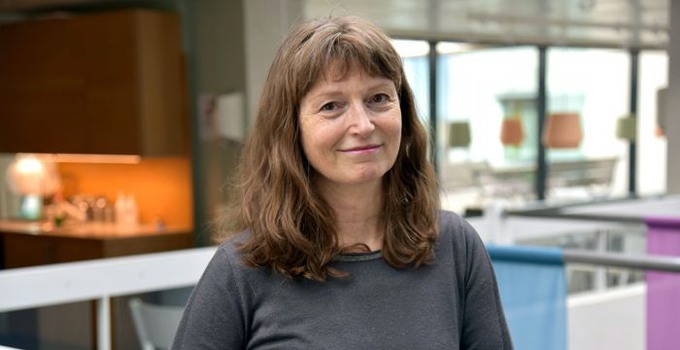
Military history research provides new perspectives
Having begun her research career focusing on European politics during the Cold War, Maria Gussarsson's interest in military history was sparked when she started digging in the War Archives.
"The historical map- and drawing collections are a goldmine for a historian", she says.
"I have always been interested in history. It is so fascinating to discover traces of people who lived in the past, and it awakens both the imagination and a desire to know more", says Maria Gussarsson, senior lecturer in military history at the Swedish Defence University.
After several years as an archivist at the Swedish War Archives, where she worked before joining the Swedish Defence University, she has extensive experience of working with historical source material.
"The work I was doing there largely centered on the absolutely fantastic historical map and drawing collections."
Research on the importance of the Field Survey Corps for the development of society
The archival work led to deeper studies and research on how the need for maps led to the establishment of a topographical corps - the Field Survey Corps - in 1805. In the book Kartans makt i krig och fred, released at the beginning of the year, she describes how the mapping of Sweden was a prerequisite that led to a number of reforms in different areas.
"The work of the Field Survey Corps contributed greatly to the modernization of Sweden that began at this time", she says.
Research on the development of the Field Survey Corps provides new perspectives on the early 19th century period and is, so far, a rather unexplored field.
"This is a type of research that not many people do. At conferences, I have met many who have been surprised that it is possible to research maps in this way, i.e. with less focus on the maps themselves and more on the organization of the activity, the connection to the armed forces and the social changes that the mapping work entailed."
Europe and international cooperation during the Cold War
Gussarsson did not originally intend to devote herself to military history research. She received her doctorate in history from Stockholm University in 2001 with a thesis on the Social Democrats’ European policy in 1955-58.
"I was, and still am, very interested in international issues. After my dissertation, I worked as a substitute lecturer at Stockholm University and at Södertörn University. I also wrote a textbook on European integration, but it was hard to get into academia."
So she trained as an archivist and got a job at the War Archives even before she finished her training.
Her interest in military history was sparked
After eight years at the War Archives, she moved on to the Swedish Defence University, where she works at the Department of Military History.
"I felt that I wanted to work full-time as a historian, and I had become more and more interested in military history."
In addition to her research focusing on the Field Survey Corps in the early 19th century, she is also interested in the period from the Second World War to the Cold War.
"I have written about gray zone problems during World War II together with a colleague, and am now planning another project that looks at the Cold War."
When asked what drives her as a researcher, she names curiosity and the importance of sharing new knowledge.
"I want to discover and disseminate new knowledge. This is also one of the reasons why I enjoy working at the Swedish Defence University so much. Here, the knowledge is directly useful, and it is very rewarding to see when the students and military participants in our programs get that “aha”-experience when they understand new contexts or discover something new. Hopefully I can get them to start thinking more freely, and question matters more often. Another important reason why I want to work here is the meeting between academia and the profession, which I find incredibly stimulating."
Josefin Svensson
In a nutshell
Title: Senior Lecturer in Military History.
At the Swedish defence University since: Part-time in an hourly position and temporary position from 2014, but has a permanent full-time position since 2018.
Current work: The book Kartans makt i krig och fred. Fältmätarna, det nya kriget och samhällelig utveckling 1805–1831.
When I am off: I like to go to my summer house on Öland.
Last read book: L'énigme des Blancs-Manteaux, a French crime novel set in the 18th century by Jean-Franҫois Parot. Besides being a historical novelist and a Francophile, books in French are a good way for me to keep my language skills active.
I like to discuss: There are many things I like to discuss: what's happening in society and the world, history of course, and environmental issues, which I think are very important.
Hidden talent: Perhaps French; I have studied it at university level both in Sweden and in France.
More about
Page information
- Published:
- 2023-03-13
- Last updated:
- 2024-03-25
